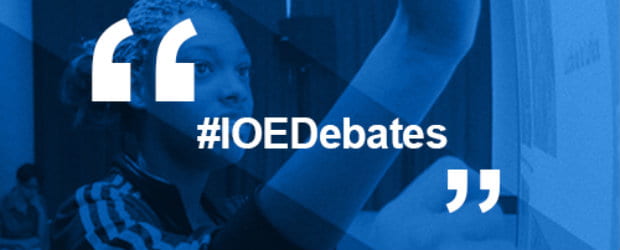Covid-19 and higher education – a chance to re-imagine the sector, at system and classroom level
By Blog Editor, IOE Digital, on 9 July 2020
9 July 2020
By IOE Events
In the third and final debate in our mini-series on Covid-19 and education we took a look at what the future could – or should – resemble for our higher education system. For What if… our education system changed for good in light of COVID-19? Part 3: higher education we heard from professors of higher education and of learning technology, a specialist in university regulation and governance, and a former universities minister.
Prior to the arrival of Covid-19, the debate about the right path for England’s higher education sector was still very much a live one. Debate was rooted in value positions running from ‘more means worse’ elitism through to calls for comprehensivisation, as well as contrasting attitudes towards marketisation. For the moment, it is not clear where the experience of the pandemic will take government policy on higher education over the medium term. In the meantime, our panel highlighted various ways in which the sector could be reoriented with a view to strengthening its contribution. Here we pick out the main themes, from classroom to system level.
The classroom
By forcing universities to pivot online, Covid-19 has set in train an opportunity to transform teaching and learning. For our panellists this concerned making greater use of online and blended learning, but also a much wider re-thinking of pedagogy and course design.
Until now something of a poor relation across much of the sector, the use of online provision has in just a few short months been accelerated by a decade. This can support wider access and dramatically enhance and enrich learning if we enlist its full potential. To that end, the debate around learning analytics and related ethical questions needs to catch up fast, falling behind as it does the parallel discussion in health. Meanwhile, the OU and Futurelearn – as well as the gaming community – have shown ways to create a sense of community online, in the process developing students as rounded citizens, not just learners in the narrow sense. As our panellists underlined, universities have a choice. They can respond to the recent jolt in a superficial way, or they can revisit who their students are and what they need for a transformative learning experience, on and offline. The path to recovery from the pandemic requires our universities to take their educational responsibilities more seriously than ever.
The system
For some on our panel, while the current tuition fee policy has opened up university education to more people, it has concomitantly undermined conceptions of higher education as a public good. The sector is seen as a group of institutions, not as a system, and those institutions compete among themselves around narrow notions of quality and prestige, notions that do not always fit what their immediate stakeholders most need.
In the wake of Covid-19, it is time to aspire to a world-leading system, not just world-leading institutions. That means embracing diversity without turning it into a hierarchy, and letting institutions re-focus on their strengths. And yet the extent of the diversity in the English system means that talking with one voice at system level is difficult beyond bland rhetoric. As we heard in our debate on Covid-19 and further education, the answer could lie in a greater privileging of place, where examples of collaboration among universities and between universities and colleges can already be found at local and regional level. These exceptions should perhaps now become the rule.
Covid-19 has exposed and exacerbated existing inequalities and foregrounded the need for public institutions that are squarely focused on serving their communities. Universities are vital institutions in that regard, from preparing public servants through to generating and sharing new knowledge and innovation. As our panellists made clear, if universities are to focus on what they are good for, not just what they are good at, the wider ‘eco-system’ must also play its part, starting with the regulatory system and the rankings and performance measures that do so much to steer them, whether directly or at a distance. From there, it is for policy makers to decide whether more really does mean worse and how much to leave to the market.
You can watch/listen back to the debate in full here, our Covid-19 and further education debate here and our Covid-19 and schools debate here.
Learn more about the IOE’s research on Covid-19 here.
 Close
Close




